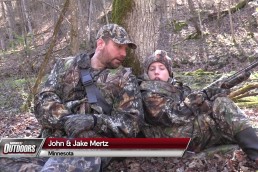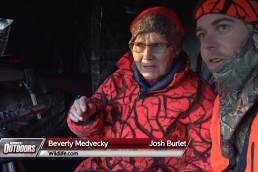Spring Training and Playing the Retriever Hunt Test Games
SHARE THIS POST
The more that a working retriever is exposed to birds, field experiences and hunting situations, the better they become. Similar to baseball spring training or preseason football camp, to get the most out of your retriever, some off-season work needs to be done. Joining a retriever club, a local training group, and running retriever hunt tests during the spring and summer months is not only fun for you, the handler, but will extend your pup’s season, and keep them both mentally and physically ready for those early morning flights come fall.
Retriever clubs and group training sessions are located across the country and work your pup in a controlled environment to not only simulate the many aspects of a real hunt, but help you teach your pup the tools it needs to be a good canine citizen. At these training sessions, dogs of all ages benefit from a wealth of knowledge and resources. Young pups and handlers are taught the ins and outs of basic obedience (the foundation for all retriever training) including sit, here, heel, sit to the whistle, and steadiness. They are also a great resource for water, bird and gun introductions, as well as early marking (looking out in the distance to see birds fall) skills.
Dogs will be eventually run through a mock hunt setup that mimics real hunting scenarios. Guns, decoys, wingers (to throw birds), and real birds will be used. You and your pup can solidify blind (line) manners in which your pup will learn to patiently and quietly wait, marking fallen birds until sent for the retrieve. Dogs will honor (watching another dog work) other dogs and work towards performing multiple retrieves. Blind retrieves (a bird the dog did not see fall) and handling/casting (taking hand signals to recover the blind retrieve) are introduced and practiced as well.
Local retriever clubs and group training sessions are great ways to get introduced to the hunt test “game.” Each test or degree progressively builds and uses skills that your dog has acquired, showcasing them in each test and in the field during the season. A retriever hunt test is a standardized evaluation in which a retriever is judged on its ability to retrieve birds in various hunting scenarios. This includes marked retrieves and possibly blind retrieves. The tests also assess the dog’s steadiness, and control.
In the United States, retriever hunt tests are governed by the A.K.C. (American Kennel Club) and the U.K.C. (United Kennel Club) with local retriever clubs hosting and organizing events. In hunt tests, as opposed to field trials, dogs are assessed on their performance based on a set of guidelines and are not competing against other dogs, much like a test or exam that you would have taken in school.
In both AKC and UKC, testing becomes more challenging as the dog progresses. This is like degrees one may acquire throughout life including a high school diploma, undergraduate degree or master’s degree, with each degree proving more knowledge and mastery of the subject matter.
In the AKC, there are three ability-based (not age) retriever hunt test levels: Junior, Senior and Master. The UKC similarly has four ability-based categories that retrievers may enter: Started, Seasoned, Finished and Upland. As with the AKC, all tests are directly related to hunting the retriever for waterfowl and upland game. Judges score dogs on their natural ability to mark and remember a fall, retrieve birds, their hunting style, and perseverance. They are also scored on learned abilities such as steadiness, control, response and delivery.

The High School Diploma—Junior and Tests
AKC Junior single retrieves are not to exceed one hundred yards, and in UKC Started Tests, single retrieves are not to exceed seventy-five yards.
Are you enjoying this post?
You can be among the first to get the latest info on where to go, what to use and how to use it!
While AKC and UKC retriever hunt tests are very similar, they each have different nuances. In both an AKC junior test and UKC started test, dogs are tasked with completing two, single-bird retrieves (one retrieve/mark at a time). Dogs must perform two series (two single retrieves) on both land and water for a total of four retrieves. AKC and UKC each have a land and water series for all levels of testing.
All AKC tests require one bird to be shot as a live flyer in the distance from a gunning station. Dogs at this level, and only these levels, may be restrained (held gently by a flat collar). In the UKC test, you blow your duck call to start the test and a gunner positioned beside you will be used to “shoot” popper/blank loads towards a bird thrown in the distance from the gunning station. In higher-level UKC tests, you will be seated with your dog next to you and actually handle the gun (provided) and “shoot” your marks.
In AKC tests, you start the test by raising your hand. Duck calls and shots come from the gunning stations in the distance. In higher-level AKC tests, you are provided with a wooden gun to point and follow multiple marks.
In all AKC tests, the dog cannot be released until the judge says so, and dogs must deliver the bird to hand. While in a started UKC test, after the marks have fallen, the handler releases the dog at their discretion and the bird must delivered to the immediate area of the handler.

The College Degree—Senior and Seasoned Tests
Advancing forward to an AKC senior test or UKC seasoned test, the dog’s abilities will be tested at a more advanced level. Dogs at this level wear no collars and are required to be steady, honor other dogs, complete multiple marks, and perform blind retrieves. In these tests, dogs are asked to make a double retrieve (two marks) one at a time and retrieve all birds to hand. This consists of a “go bird” which is the last bird to fall, and a “memory” bird which is the first bird thrown. At some point during the test, you will be asked to do a walk up or out. Tthe dog walks on heel and immediately sits, marking a bird or birds falling in the distance.) A blind retrieve in the form of a “planted” dead bird is also included and the dog must be handled to it.

The Masters Degree—Master and Finished Tests
The most advanced level of the basic AKC and UKC retriever hunt tests is a master test (AKC) and a finished test (UKC). These tests were created to challenge even the best hunting retrievers and handlers. Both tests require and include all the abilities of a senior or seasoned dog; however, at least three marks/birds (a triple or quad) are added, as well as longer overall distances, multiple blind retrieves, and more challenging terrain.
From preparing for the hunting season, to measuring your dog’s progress, to making lifelong friends in a social environment, the advantages to joining a retriever club, group training sessions, and hunt testing are endless. However, most importantly, it is a way to spend more time with your pup, building forever bonds and love that create a lifetime of memories.
MWO
SHARE THIS POST
You may also like...
0 CommentsSouth Dakota Turkey Hunt
Did you enjoy this post?
You can be among the first to get the latest info on where to go, what to use and how to use it!


